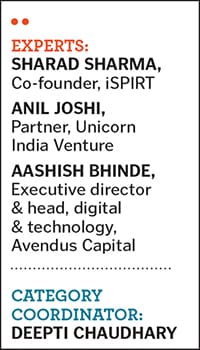
Pranshu Patni: The dispenser of languages
Learning new languages is fun with CultureAlley's Pranshu Patni
Pranshu Patni | 28
Co-founder, CultureAlley
Category: Ecommerce
Pranshu Patni, 28, is solving a problem that she faced from close quarters: Effective communication. In early 2012, her fiancé (now husband) Nishant had to relocate to Shanghai, China, for an exchange programme and was trying to learn Mandarin in a hurry. He was a student at Kellogg School of Management in the US and did not eat meat. Nishant was worried whether he’d be able to communicate his dietary needs to the locals. He tried to learn Mandarin through tutorial books, online courses, and attending language learning classes. But nothing seemed to fit his busy schedule.
Pranshu realised that while a majority of people are keen to master an international language, there are very few avenues that can help working professionals hone their skills continuously over a flexible period of time. In the meantime, Nishant went to China in early 2012, returned to India later that year and launched Intap Labs with Pranshu. The startup runs the popular language-learning platform, CultureAlley. Here, people can learn a number of languages, including Mandarin, English, Hindi and Spanish, through various training models and even live one-on-one sessions with tutors via Skype.
In October, CultureAlley launched its mobile learning application, English-App, which helps subscribers learn the language through interactive modules. Since its launch, the app has become one of the most popular educational apps on Google Play’s Indian Android store with over 4,50,000 downloads across more than 220 nations. What sets CultureAlley’s language courses apart from many of its competitors are their focus on making the subject a part of a student’s daily routine. The software, for instance, inserts foreign words in a user’s Facebook newsfeed so that he/she becomes more comfortable with the language. This simple vocabulary building tool is a teaser, tempting users to subscribe to game-based learning tools. (The app can be downloaded for free, but users have to pay or use tokens won in previous games if they want to access higher difficulty levels.) “We generate revenues though advertisements on the app. We are increasing our focus on mobile as the cost of acquiring customers is low. One user pays us back in one week,” she says.
According to Pranshu, traditional methods such as flash cards and CDs are no longer enough to keep students engaged. CultureAlley’s modules and interactive games try to address this problem. Through this app, the Patnis are making an effort to tap the growing market in China, Latin America and India. “One billion people from all over the world try to learn a foreign language every year; about 60 percent are learning English,” says Pranshu.
While learning languages through mobile apps is a relatively new concept in India, CultureAlley faces global competition from companies such as Rosetta Stone, which uses popular teaching methods, including computer-assisted language learning software and a free crowd-sourced text translation platform. But Pranshu is confident about CultureAlley’s quality of content, which is created in association with linguists and teachers, its convenience of learning on a handset, and her understanding of the Indian market. “Most apps, for instance, just translate from Hindi to English, they don’t interact, and there are no audios or visuals and no practice games. Ours is an interactive software that draws users in. There’s also a helpline,” she says.

The company’s early success has attracted angel investors Rajan Anandan, Sunil Kalra, Bhupen Shah (founder of Sling Media) and Prem Jain. It recently raised half a million US dollars from 500 Startups, a US based accelerator. Mumbai-based Kae Capital is an institutional investor in CultureAlley.
“Online language learning platforms are of huge interest to investors as one can go beyond India and tap international markets,” says Sasha Mirchandani, founder of Kae Capital. “This can be a very profitable venture.” And right now, for CultureAlley, growth is the priority.
Here is the full list of 30 Under 30 for 2015 and its methodology
(This story appears in the 30 November, -0001 issue of Forbes India. To visit our Archives, click here.)






